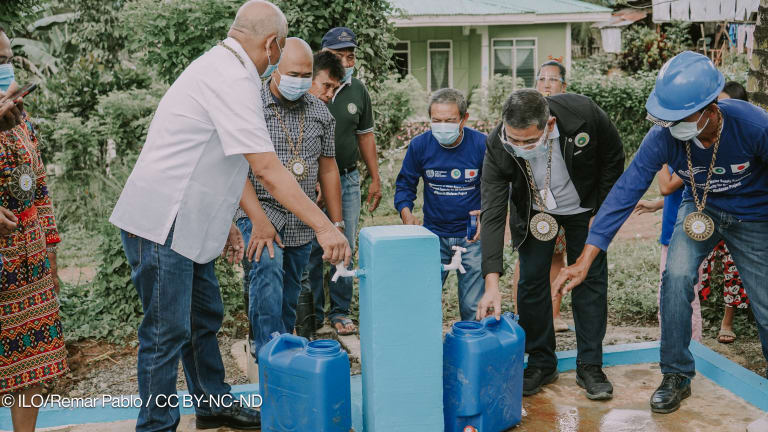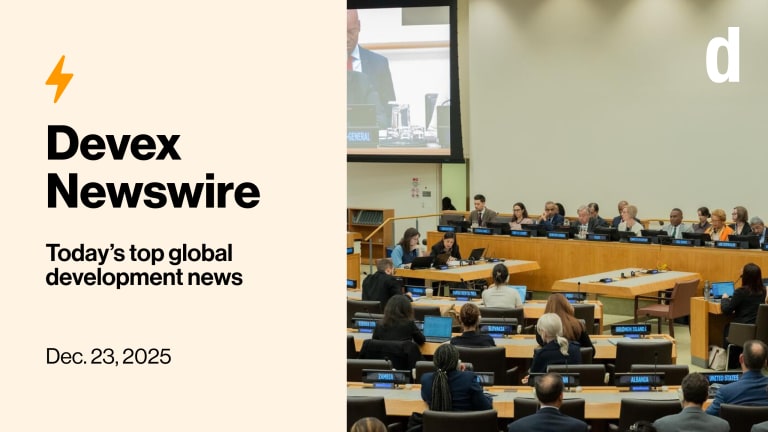
CANBERRA — Australian Prime Minister Scott Morrison announced the reduction of the foreign aid budget on Tuesday, setting international assistance on a low trajectory for years to come.
Australia’s aid allocation has been reduced to 4.04 billion Australian dollars ($2.86 billion) for the 2019-20 financial year, down from the projected final spend of AU$4.33 billion for the current financial year, creating concern for the development sector.
This was a cut previously forecast as the government set Australia’s aid budget at a mark of AU$4 billion for the forward estimates until 2022-23, when it will see a slight increase to AU$4.1 billion in line with indexation. And the budget confirmed the commitment made by the Assistant Minister for International Development and the Pacific Anne Ruston to Devex that the budget as forecast would remain.
But this means Australia’s foreign aid will reach a low point in 2021-22, when official development assistance drops to 0.19 percent of gross national income — significantly down from recommended Organisation for Economic Co-operation and Development targets of 0.7 percent.
More on Australian aid:
► Rethinking inclusion in Australian aid projects
► A checklist for engaging the Australian government in humanitarian action
► Australian aid: The financial impact of a new government revealed
“We see this as another cut,” Lucy Manne, head of policy and campaigns with ActionAid Australia, told Devex. “Any failure to return to indexation is just another cut.”
It was a feeling echoed by the development sector in Australia.
“The prime minister had an opportunity to show global leadership, instead he has chosen to pander to populism and cut vital services to our poorest neighbors,” Jody Lightfoot, director of Campaign for Australian Aid, said. “Countries like the United Kingdom are now more than three times more generous than Australia in helping our poorest neighbors overcome poverty.”
The headline figures
The final spend for the 2018-19 financial year is expected to be AU$4.33 billion — higher than forecast due to the government bringing forward some multilateral payments to this financial year.
Within the allocated budget for 2019-20, AU$1.4 billion will be allocated to the Pacific region, up from AU$1.3 billion last year — the highest ever Australian aid investment in the region. This accounts for more than a third of the total aid budget.
Papua New Guinea remains the biggest beneficiary, receiving AU$512.3 million in 2019-20 — down from AU$519.5 in 2018-19. And by sector, effective governance is the priority investment, accounting for 20.4 percent of the budget, followed by infrastructure and trade (18.8 percent) and building resilience (17.1 percent).
Impact of the Australian Infrastructure Financing Facility
The biggest new initiative under the Australian aid budget is the Australian Infrastructure Financing Facility for the Pacific — previously announced by Morrison as part of the “Pacific step up” campaign. With legislation passed to finance the facility, questions remained whether the funding — including AU$500 million grant portion of the financing facility — would result in other areas of aid being cut. It was a question not answered clearly in the mid-year budget leading to speculation that the cuts were from multilateral funding.
AIFFP and the prioritization of the Pacific comes at the expense of bilateral programs elsewhere in Asia — particularly Bangladesh, Cambodia, Indonesia, Nepal, and Pakistan, with partner governments only discovering the news with the release of the budget papers. Pakistan will suffer one of the biggest cuts with ODA allocation dropping more than half, to AU$19 million in 2019-20, while Nepal will see assistance drop by 42 percent.
And there are still concerns that the rushed legislation will disadvantage groups — including women.
“We’re really interested in finding out more about the trends towards these large infrastructure projects and away from civil society,” Manne said. “They are being rushed through to advance Australia’s interests in the region without listening to partners and consulting women’s groups.”
Among the other big cuts was a drop in funding for InnovationXchange, established by former Foreign Minister Julie Bishop as a unit within the Department for Foreign Affairs and Trade to support innovation in Australian aid, from AU$35 million to AU$11 million. DFAT explained in a budget briefing that this was due to the mainstreaming of innovation activities within the broader work of DFAT.
Regional scholarships and education programs have also seen a drop, from AU$101.8 million to AU$84.8 million. Allocations for health, water, and sanitation have dropped from AU$108.1 million to AU$102.4 million. The Australian Volunteers Program has dropped from AU$42.6 million to AU$40 million. And cash payments to multilateral organizations are set to drop from AU$358.6 million to AU$234.6 — but DFAT confirmed commitments made for multilateral replenishments will not be cut.
Other winners
While the Pacific is the big winner in Australia’s aid budget, there are other beneficiaries with the shifting allocation of funds.
The allocation of funding for humanitarian aid continues to increase, with AU$450 million allocated in 2019-20, up from AU$410 million in 2018-19. The humanitarian allocation is expected to continue to increase to reach the commitment to increase overall spending in this area to AU$500 million per annum as outlined in the Foreign Policy White Paper.
DFAT itself is also a winner with departmental allocation increasing from AU$255.2 million to AU$259 million to support an increase of skilled staff required for AIFFP. And other government departments, particularly Treasury, are contributing more to ODA — up from AU$365.1 million to AU$444.1 million.
The development sector’s response
Marc Purcell, CEO of the Australian Council for International Development, raised concerns that the budget shows Australia is out of step with the global need.
“Given the downward aid trajectory, Australia is at risk of defaulting on its international commitments,” Purcell told the media. “The government is opening up a huge black hole in how it will contribute to addressing major global challenges, like climate change.”
And while Australia was maintaining existing international commitments, he was concerned about the lack of forward thinking.
“It is very worrying for the government not to have made provisions for international commitments in the short-to-medium term,” Purcell said. “This will be very problematic for the next government.”
In the event of a new government, which polls are predicting, a mini-budget delivered in September may see Australian aid change again.
But warnings expressed to Devex by a source within the aid program were that this budget should not be treated lightly — it is the budget moving forward unless changes are made, and development leaders will need to be pushing for changes as part of the election campaign and in engaging with a new government.
Stay tuned for further insight on the response to the budget for Devex Pro subscribers.
Search for articles
Most Read
- 1
- 2
- 3
- 4
- 5








